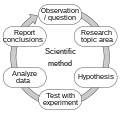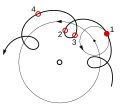Science
Science is a systematic enterprise that builds and organizes knowledge in the form of testable explanations and predictions about the universe. The earliest roots of science can be traced to Ancient Egypt and Mesopotamia in around 3500 to 3000 BCE.
History of Science[edit]
The history of science involves the study of the development of science and scientific knowledge, including both the natural and social sciences. The history of the physical sciences such as physics and chemistry, biological sciences such as biology and medicine, and social sciences such as psychology and economics are all part of the larger history of science.
Branches of Science[edit]
Science is divided into three major branches: Natural science, Social science, and Formal science. Each of these branches comprise various specialized yet overlapping scientific disciplines that often possess their own nomenclature and expertise.
Natural Science[edit]
Natural science is a branch of science concerned with the description, prediction, and understanding of natural phenomena, based on empirical evidence from observation and experimentation. It can be divided into two main branches: Life science and Physical science.
Social Science[edit]
Social science is a branch of science devoted to the study of societies and the relationships among individuals within those societies. It includes disciplines such as Anthropology, Sociology, Psychology, and Economics.
Formal Science[edit]
Formal science is a branch of science concerned with formal systems, such as logic, mathematics, information theory, systems theory, decision theory, statistics, and theoretical computer science.
Scientific Method[edit]
The Scientific method is an empirical method of acquiring knowledge that has characterized the development of science since at least the 17th century. It involves careful observation, applying rigorous skepticism about what is observed, given that cognitive assumptions can distort how one interprets the observation.
Impact of Science[edit]
Science has had a profound impact on society, and its applications are continually reshaping the world. From the development of technology to the understanding of the natural world, science has provided us with a way to understand the universe and our place in it.
| Part of a series on |
| Science |
|---|
 |
| General |
| Branches |
| In society |
| History of science | ||||||||||
|---|---|---|---|---|---|---|---|---|---|---|
|
| Natural science |
|---|
|
|
| Social sciences | ||||||||||
|---|---|---|---|---|---|---|---|---|---|---|
This social science related article is a stub.
|
| Formal sciences | ||||||||
|---|---|---|---|---|---|---|---|---|
This Formal science related article is a stub.
|
| Scientific method | ||||||||||
|---|---|---|---|---|---|---|---|---|---|---|
This Scientific method related article is a stub.
|
-
Plimpton 322
-
Plato's Academy Mosaic
-
Vienna Dioscorides Peacock
-
De Revolutionibus Manuscript
-
Newton's Principia Title Page
-
Darwin Tree 1837
-
Ozone Hole over Antarctica
-
EHT Images of M87
-
Supply and Demand Equilibrium
-
The Scientific Method
-
Nature Cover, November 4, 1869
-
Epicycle and Deferent
Ad. Transform your life with W8MD's Budget GLP-1 injections from $75


W8MD offers a medical weight loss program to lose weight in Philadelphia. Our physician-supervised medical weight loss provides:
- Weight loss injections in NYC (generic and brand names):
- Zepbound / Mounjaro, Wegovy / Ozempic, Saxenda
- Most insurances accepted or discounted self-pay rates. We will obtain insurance prior authorizations if needed.
- Generic GLP1 weight loss injections from $75 for the starting dose.
- Also offer prescription weight loss medications including Phentermine, Qsymia, Diethylpropion, Contrave etc.
NYC weight loss doctor appointmentsNYC weight loss doctor appointments
Start your NYC weight loss journey today at our NYC medical weight loss and Philadelphia medical weight loss clinics.
- Call 718-946-5500 to lose weight in NYC or for medical weight loss in Philadelphia 215-676-2334.
- Tags:NYC medical weight loss, Philadelphia lose weight Zepbound NYC, Budget GLP1 weight loss injections, Wegovy Philadelphia, Wegovy NYC, Philadelphia medical weight loss, Brookly weight loss and Wegovy NYC
|
WikiMD's Wellness Encyclopedia |
| Let Food Be Thy Medicine Medicine Thy Food - Hippocrates |
Medical Disclaimer: WikiMD is not a substitute for professional medical advice. The information on WikiMD is provided as an information resource only, may be incorrect, outdated or misleading, and is not to be used or relied on for any diagnostic or treatment purposes. Please consult your health care provider before making any healthcare decisions or for guidance about a specific medical condition. WikiMD expressly disclaims responsibility, and shall have no liability, for any damages, loss, injury, or liability whatsoever suffered as a result of your reliance on the information contained in this site. By visiting this site you agree to the foregoing terms and conditions, which may from time to time be changed or supplemented by WikiMD. If you do not agree to the foregoing terms and conditions, you should not enter or use this site. See full disclaimer.
Credits:Most images are courtesy of Wikimedia commons, and templates, categories Wikipedia, licensed under CC BY SA or similar.
Translate this page: - East Asian
中文,
日本,
한국어,
South Asian
हिन्दी,
தமிழ்,
తెలుగు,
Urdu,
ಕನ್ನಡ,
Southeast Asian
Indonesian,
Vietnamese,
Thai,
မြန်မာဘာသာ,
বাংলা
European
español,
Deutsch,
français,
Greek,
português do Brasil,
polski,
română,
русский,
Nederlands,
norsk,
svenska,
suomi,
Italian
Middle Eastern & African
عربى,
Turkish,
Persian,
Hebrew,
Afrikaans,
isiZulu,
Kiswahili,
Other
Bulgarian,
Hungarian,
Czech,
Swedish,
മലയാളം,
मराठी,
ਪੰਜਾਬੀ,
ગુજરાતી,
Portuguese,
Ukrainian








